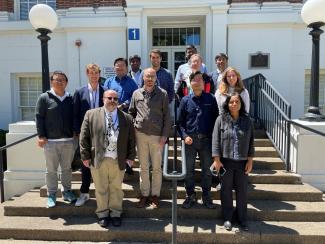Key researchers from U.S. Department of Energy (DOE) national laboratories converged on NETL’s Albany, Oregon, site to discuss hydrogen energy-related research work of eXtremeMAT-H2— an NETL-led consortium of laboratories that accelerates the development of cost-effective alloys for use in the harsh environments of advanced energy systems.
Clean hydrogen is integral to achieving net-zero greenhouse gas emissions. Hydrogen offers significant potential to reduce carbon dioxide (CO2) in sectors that are difficult to decarbonize such as power generation, heavy duty transportation, chemicals production, and industrial heating. However, there are materials-related challenges.
At lower temperatures, exposure to hydrogen can make certain alloys brittle, which can lead to premature failure of components. However, little has been reported on the impact of hydrogen on the performance of alloys at elevated temperatures.
Alloys undergo a failure over time at elevated temperatures called “creep.” As a result, alloys begin to deform at loads below yield strength leading to component failure. Limited studies have shown that the creep life of alloys is decreased in hydrogen environments, even for alloys that show no hydrogen embrittlement under similar test conditions in short term tensile tests. With more and more power and industrial processes switching to hydrogen, it is important to understand the impact of hydrogen on the long-term performance of alloys at elevated temperatures.
NETL is currently evaluating the impacts of hydrogen on materials so that models can be developed that lead to an understanding of hydrogen-related impacts. The work will ultimately help establish a new domestic supply chain of hydrogen-resistant materials.
The eXtremeMAT approach harnesses the unique, world leading capabilities of national laboratories, in a focused, coordinated and collaborative way to demonstrate ways to design a new generation of computational and experimental validation toolsets accelerating the discovery, scale-up and manufacture of advanced energy materials for harsh service environments.
The original eXtremeMAT team consisted of NETL, Ames Lab, Idaho National Lab, Lawrence Livermore National Lab, Los Alamos National Lab, Oak Ridge National Lab, and Pacific Northwest National Lab. Specifically, the team developed a data-driven framework for predicting the creep behavior of steels used in construction of power plants.
The accomplishments of the consortium included development of models that can simulate 10 years of creep behavior in less than five hours; predictions for the impact of alloy chemistry including trace elements on creep performance; development of a framework for predicting creep performance of welds and the capability to model cyclical loading conditions.
The eXtremeMAT-H2 consortium is building on those successes and extending the tools developed for predicting long term alloy performance in hydrogen environments at elevated temperature service conditions. The eXtremeMAT-H2 team consist of researchers from NETL, Ames Lab, Los Alamos National Lab, Oak Ridge National Laboratory, and Sandia National Laboratories. Information on eXtremeMAT and eXtremeMAT-H2 can be found here.
According to, NETL’s Associate Director of Materials Engineering and Manufacturing David Alman, “The new tools of eXtremeMAT-H2 team will allow for better predictive capability of alloy performance which can enhance the reliability and safety of components operating in hydrogen at elevated temperatures. This will aid in the transition to hydrogen to produce power, chemicals, steels and other applications.”
NETL is internationally recognized for its leadership in designing, developing, and deploying advanced materials for use in energy applications and extreme service environments. NETL researchers have designed, engineered, and evaluated materials ranging from atomistic to pilot-plant scales and it uses a one-of-a-kind suite of computational and experimental methods for translating new material science concepts into practical technologies.
Construction of the Advanced Alloy Signature Center, a complete alloy development facility capable of prototyping alloys at scales that advance commercialization is underway at the Albany site. The center represents a significant investment to accelerate commercialization of superalloys and other high-performance materials needed to develop corrosion-resistant components for environmentally friendly, highly efficient hydrogen energy facilities, power plants, advanced manufacturing processes in growing industries and applications vital to national security.
During their visit to Albany, consortium representatives toured NETL’s Melt Processing Laboratory, Thermo-Mechanical Processing Lab, Environmental Mechanical Testing Lab, Thermo-Physical Testing Lab, High Pressure Immersion and Reactive Transport lab, Geoscience, Artificial Intelligence, and Analysis Lab.
NETL is a DOE national laboratory that drives innovation and delivers solutions for an environmentally sustainable and prosperous energy future. By using its world-class talent and research facilities, NETL is ensuring affordable, abundant and reliable energy that drives a robust economy and national security, while developing technologies to manage carbon across the full life cycle, enabling environmental sustainability for all Americans.




